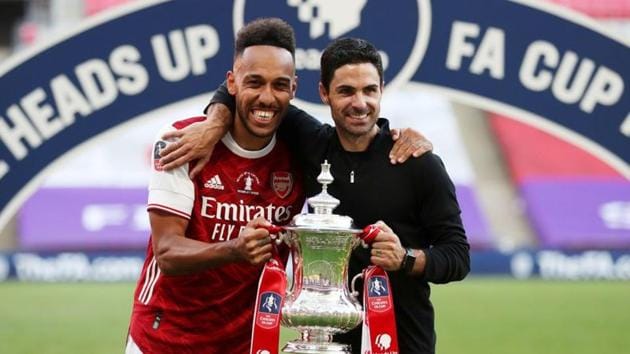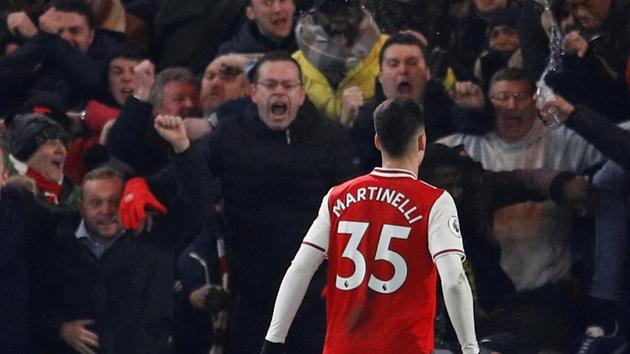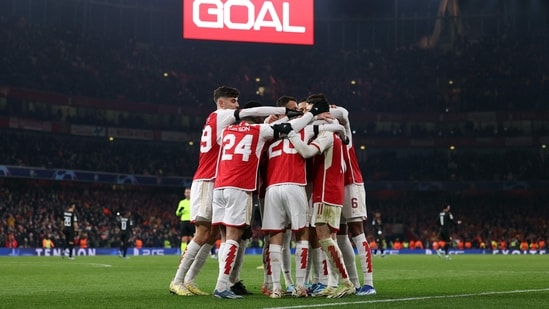It has been 20 years since Arsenal last won the Premier League, when a team managed by Arsene Wenger ended the 2003-04 season without a single defeat, becoming the first team ever to do so in a 38-game league campaign. Since then, they have failed to clinch a single Premier League title, having become secondary to the likes of Manchester United, Chelsea, Liverpool and Manchester City. The closest they came was in the 2015-16 season, where The Gunners bottled their chances and gave Leicester City a historic first Premier League title. Finally, after two decades of excruciatingly long anticipation, the tide appears to have shifted. Arsenal’s impressive start to this Premier League season has instilled belief and hope among both the team and its fans that their prolonged wait for a Premier League silverware might come to an end sooner. How did this transformation unfold? We’re here to break it all down for you.
Post-Arsene Wenger era
The primary reason behind Arsenal’s invincibles campaign was the presence of legendary players like Theirry Henry, Dennis Bergkamp, Patrick Veira, Robert Pires and Jens Lehmann. But since their departure, the club fell behind other heavyweights in the country. Wenger departed from the club on May 13 2018, after receiving constant criticism from fans, but it didn’t help.

The post-Wenger era began with Spaniard Unai Emery, at the helm. Emery became the club’s first-ever head coach and second manager from outside the United Kingdom. In Emery’s first season, Arsenal finished in fifth position in the Premier League, and also finished as runners-up in the Europa League. But in November 2019, the former Sevilla head-coach was sacked after a string of poor performances and bad transfers, Emery was sacked, with Freddie Ljungberg, who was part of the 2003-04 triumph, replacing him as interim head coach.
Arrival of Mikel Arteta
In December 2019, the club appointed former captain Mikel Arteta as the new head coach. The announcement hit the headlines, particularly due to his tenure as Pep Guardiola’s assistant at The Etihad. Upon his appointment, Arteta got straight to the point and stated that he wanted his players ‘to take responsibility’, which was missing in the past few years. “I want people to take responsibility for their jobs and I want people who deliver passion and energy in the football club. Anyone who doesn’t buy into this, or that has a negative effect or whatever, is not good enough for this environment or this culture,” he said.
His arrival wasn’t an easy job though, as he had to fix the dressing room environment, which was negatively affected by the presence of senior players like Pierre-Emerick Aubameyang and Alexandre Lacazette.

Arteta’s first campaign included a FA Cup trophy, where they defeated Chelsea in the final, making him the first person to win the trophy as both captain and coach of the club. He also became the first head coach or manager to clinch a major title in his first season in charge of the club, since George Graham in 1986-87. In August 2020, Arteta bagged his second trophy as Arsenal manager, after they defeated Liverpool 5-4 on penalties in the FA Community Shield. In September the same year, his role was formally changed from first team head coach to manager, which made his control over the club more expansive.
Rebuilding process
Until the 2021-22 season, Arteta was occupied with rebuilding Arsenal, and bringing in confidence to a side, which was lacking in self-belief. After finishing in fifth position in the 2021-22 table, Arsenal began their 2022-23 campaign with a 2-0 win against Crystal Palace, which marked his 50th league victory as The Gunners boss, making him the second-quickest manager to reach 50 top-flight wins for the club after Wenger. The 2022-23 season also saw him make some big transfers, including Fabio Viera (from Porto for 29.9 million pounds), Gabrel Jesus (from Manchester City for 45 million pounds), Oleksandr Zinchenko (from Manchester City for 30 million pounds), Leandro Trossard (21 million pounds from Brighton & Hove Albion) and Jorginho (from Chelsea for 12 million pounds).
Resurgence in 2022-23 Premier League
The 2022-23 Premier League season began with Arsenal recording their best start to a top-flight campaign as they won nine of their first ten league matches for the first-time ever. They were also four points clear on top of the Premier League standings. Then, in January 2023, Arsenal defeated Manchester United at home, which gave them a five-point advantage at the top of the table, with a game in hand. But the joy was short lived as they crashed out of the Europa League, losing to Sporting CP on penalties.

Arsenal’s seven-game winning streak spanning from mid-February to early-April derailed with three back-to-back draws against Liverpool, West Ham United and Southampton. It just didn’t end there, as they crashed to a brutal 1-4 defeat at the Etihad Stadium, which allowed second-placed Manchester City to capitalise. By the time it was mid-May, Arsenal could no longer mathematically win the title after consecutive defeats to Brighton and Nottingham Forest, which saw them squander their title-winning chances, and hand over the trophy to Manchester City, eventually crowned the Premier League champions for the third consecutive season to also complete a continental treble.
Despite failing to win the Premier League, the team’s second position saw Arteta become the first manager since Arsene Wenger’s tenure six years ago, to lead Arsenal to a Champions League qualification spot. It was also the highest position in which Arsenal finished after being runners-up in 2015-16.
Arrival of Martin Odegaard
The most pivotal player for Arsenal in the 2022-23 season was none other than Norwegian star Martin Odegaard. The former Real Madrid player first arrived at the club in January 2021, until the end of the season. His arrival meant bad news for upcoming star Emile Smith Rowe, and fans were initially apprehensive. But soon, Odegaard became a favourite at The Emirates and replaced Smith Rowe, to establish himself as the starting attacking midfielder. In August 2021, the club announced the permanent signing of Odegaard in a deal worth 35 million Euros, with potential add-ons, rising to around 40 million euros. He signed a four-year deal until 2024 with the club having an option to extend for a fifth year.
Following the departure of Pierre-Emerick Aubameyang and Alexandre Lacazette, Arteta named Odegaard as the new skipper for Arsenal, ahead of the 2022-23 season. The ex-Stromsgodset had a slow start to his Arsenal tenure, and featured in 14 Premier League matches in the 2020-21 season, registering a goal and two assists. Then in the 2021-22 Premier League season, he featured in 36 matches and became a crucial cog in the playing XI, scoring seven goals and four assists.
Boasting promising numbers in his first two campaigns, Odegaard rose to the occasion during the 2022-23 season and was also named as captain by Arteta. He appeared in 37 Premier League matches as Arsenal finished in second position, scoring 15 goals and grabbing eight assists.
Some key additions
After losing the Premier League title last season, Arsenal began the 2023-24 season with some huge transfers. During the summer transfer window this year, they first signed Kai Havertz from Chelsea for 62.0 million pounds, with add-ons. Then, they added depth to their backline, acquiring Jurrien Timber from Ajax for 34.3 million pounds, with add-ons, followed by a club-record arrival of England midfielder Declan Rice from West Ham for reportedly 100 million pounds, and add-ons. Meanwhile, the window also saw former captain Granit Xhaka depart for Bayer Leverkusen in Germany.
Arsenal began their 2023-24 campaign with a 4-1 win via penalty shoot-out after a 1-1 draw against defending champions Manchester City, claiming the 2023 FA Community Shield, which was also Arteta’s third trophy in the club. On October 8, Arsenal also got revenge from Pep Guardiola’s side for last season, claiming a narrow 1-0 win, courtesy of a well-worked goal by late substitutes Takehiro Tomiyasu, Kai Havertz, and scored by Gabriel Martinelli. The result also ended Arsenal’s 12-game straight losing run against Man City in the Premier League. Aiming to pip Manchester City to the title this season, Arsenal climbed to pole position on November 25, which saw them defeat Brentford 1-0, away from home.

Arsenal’s return as one of Europe’s heavyweights was perfectly reflected in their most recent outing, where they defeated Lens in their Champions League group stage fixture. Havertz (13′), Jesus (21′), Bukayo Saka (23′) and Martinelli (27′), Odegaard (45+1′) and Jorginho (86′) registered their names in the scoresheet as Arsenal cruised to a 6-0 victory at the Emirates. The win also saw them confirm the spot in the UCL knockouts this season, finishing on top of Group B. They have one more Champions League group stage fixture to go, and are currently on top of their group with 12 points in five games (four wins and a loss).


